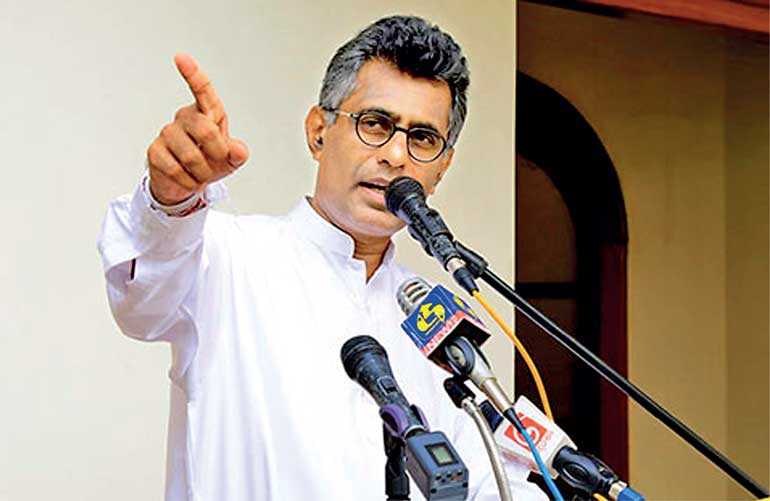Saturday Feb 28, 2026
Saturday Feb 28, 2026
Friday, 18 December 2020 00:02 - - {{hitsCtrl.values.hits}}

What the country demands today is not a tribal leader, but a modernist leader who respects and promotes modern values. Champika Ranawaka is educated; yet he can be considered only as a narrow tribal leader
How can Sri Lanka overcome the crisis it is facing in a situation where the country has become a failed state with all the leaders, all political parties, and the Legislature, the Executive and the Judiciary has  failed?
failed?
The country’s political leaders still do not seem to understand the real reasons behind this failure, and the extent to which they themselves have contributed to it. They appear to think the more Gota fails, the more it increases the chances of them being successful. But, it is not only Gota who has failed; all the leaders in the country have also failed.
It is only the foolish leaders who are ignorant of this crisis could dream of holding an election without directing the country towards adopting a People’s Constitution that gives priority for structural changes badly needed to recreate the country.
If they do not have tears to shed for the serious destruction they have done to this country and its people, if they cannot atone for the contribution they have made to this destruction, and if they still think of exploiting the essence of the country which has already become a hapless chew, for their personal gains, the nature will invariably punish them if not the people. In fact, the damage they have done to this country is thousand times greater than the damage done by Zaharan.
Champika Ranawaka
When I heard the exciting speech made by Champika Ranawaka, an alternative leader when he resigned from the Jathika Hela Urumaya (JHU), it didn’t cause me to raise bright hopes in me except a great fear of the future of the country.
I knew Champika well. Perhaps, I may be the one who saved his life during the Second JVP insurrection. He used to visit the Ravaya office from time to time when the Ravaya magazine was published in a small house at the Old Galwala Road in Mount Lavinia. He was an undergraduate of the Faculty of Engineering at the time. During the second JVP insurrection, Champika was abducted by the security forces. I spoke to a military officer known to me and asked him to see that no harm would be done to him as his hands were not smeared with blood.
Surprisingly, Champika had been abducted and detained in the camp of the officer I spoke to. But the military officer did not tell me about that. After some time, Champika had been left in front of the Ravaya office, blindfolded. It happened in the night. At that time, I used to sleep at night in a small room in the same office. Champika’s hair and the beard had grown long. It was at the Ravaya office that he cut his hair and shaved the beard before he went home.
The second insurrection
I knew that the second insurrection was imminent long before the assassination of Daya Pathirana. I could sense it. Also, I spoke to Hector Abeywardena, Carlo Fonseka and Tissa Vitarana about it.
At the height of insurrection, the JVP had inclined to enter into a dialogue with the political alliance formed by the left parties including the SLFP. Soon it became evident that the strategic aim of the JVP had been to pursue the insurgency successfully by persuading Sirima Bandaranaike not to contest the 1988 Presidential Election. But Sirima Bandaranaike did not get caught in their trick.
My views also influenced the firm stance taken by her in this case. I stressed that despite numerous threats, the election rallies must be held and the fear of the people allayed. I came to know of the attempt to hold a rally in Ambalangoda and its failure due to the protest of the organisers of the constituency itself. In this context, while being in the background, I made arrangements for a meeting to be held in Galle in front of Galle Town Hall.
When the JVP failed to noose Sirima Bandaranaike in their trap, they went to the extent of killing the members of the party. So much so, the JVP proscribed the Presidential Election and announced that working for the presidential election and voting was an offence punishable by death.
I wrote an editorial against their order and urged the people to go to polls and vote without fear. My political analysis was to warn that the JVP would have to pay a heavy price for blocking the Presidential Election so that there would be no change of government. Further, I designed the outer cover of the Ravaya magazine with a picture of a river flowing with blood instead of water.
That was exactly what happened in the end. The country had become a dismal graveyard when the insurrection was over. Both sides had unleashed maximum cruelty on society. While a large number of young people in the Sinhala society had died, all those who survived also remained almost dead, spiritually. Perhaps, the country may not have fallen into such a miserable state as it is now, if the JVP had allowed for a change of government without blocking the 1988 Presidential Election.
After the insurrection
After the insurrection was over, Champika used to visit the Ravaya office from time to time with his political friends. Among them was Gevindu Kumaratunga, a grandson of Kumaratunga Munidasa.
I advised Champika to join either the SLFP or the UNP and enter a major political stream and orientate those parties in adopting a better vision. He told me that he would like to join the SLFP and sought my assistance in arranging a meeting for him to meet with Mrs. Bandaranaike.
I talked to Anuruddha Ratwatte and Mrs. Bandaranaike about Champika. Mrs. Bandaranaike consented to have a meeting with Champika and his associates, which was attended by Mrs. Bandaranaike from the SLFP, Suriyapperuma, the Party Secretary, Anuruddha Ratwatte and Mahinda Rajapaksa. I accompanied Champika with four or five others, and Gevindu Kumaratunga was also among them.
Despite a lengthy discussion between the two parties, Champika did not join the SLFP. Instead, he embarked on a journey of his own. Eventually, he became a very powerful national leader representing the interests of Sinhala Buddhists. Now his ambition may be to become the next leader of the country. He was not a stakeholder of the political program that brought Gota to power. But by and large he was instrumental in creating the socio-political environment that led to this political outcome.
The Sinhala Buddhist flag he carried is now in the hands of the Rajapaksas. Champika must be thinking that the people will accept him as their leader when Gota fails. This reflects that, no matter how educated he is, he still does not seem to understand that the old era of politics that he represents is now over.
Where is the future headed?
In his speech, Champika proudly described the service he has rendered on behalf of the Sinhala Buddhists. He has also endorsed all the measures taken to oppress minorities and provoke terrible conflicts for the betterment of Sinhala Buddhists. Although he had talked about Prabhakaran, there was no mention whatsoever of the Black July ’83.
He had talked about Gangodawila Soma Thera, but nothing about the undue political gains reaped by attributing the sudden demise of the latter to a fabricated plot of assassination. The devastation that might have ensued wouldn’t have been small if that fabrication had gone far.
In that backdrop, I wrote and published a book titled ‘Pansale Viplavaya’ (Revolt in the Temple) on this dubious ploy. Neither has he mentioned anything about the socialisation of the episodes of sterilisation to create a Muslim enemy in place of the Tamil enemy following the military defeat of Prabhakaran.
If the extremist programs implemented by suppressing minority ethnic groups were practical and successful, then in a situation where Sinhala Buddhists constitute the vast majority in the country, the State, the institutional system of Sri Lanka, the Sinhala Buddhists and the Buddha Sasana would have displayed an outstanding progress. Yet, on the contrary, they are not in a state of blissful heaven but in the abyss of hell.
What the country demands today is not a tribal leader, but a modernist leader who respects and promotes modern values. Champika is educated; yet he can be considered only as a narrow tribal leader.